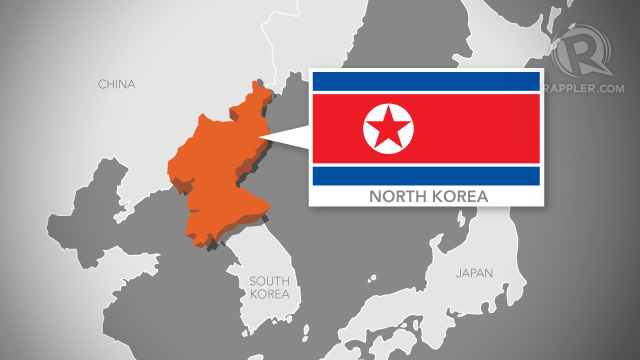SUMMARY
This is AI generated summarization, which may have errors. For context, always refer to the full article.

SEOUL, South Korea (4th UPDATE) – North Korea laid down rigid pre-conditions Thursday, April 18, for dialogue with Seoul or Washington, including the withdrawal of UN sanctions and a guaranteed end to South Korea-US joint military drills.
The list of demands from the North’s top military body was swiftly rejected as “incomprehensible” by South Korea which, together with the US, has made any talks conditional on the North taking steps towards denuclearization.
Dialogue has become the new focus of a blistering rhetorical battle that has sent military tensions soaring on the Korean peninsula ever since the North carried out its third nuclear test in February.
Some analysts see the North’s engagement in a debate over dialogue — no matter how unrealistic the conditions — as a welcome shift from the apocalyptic threats of nuclear war that have poured out of Pyongyang in recent weeks.
“I don’t think Pyongyang really expects these conditions to be met,” said Yang Moo-Jin, a professor at the University of North Korean Studies in Seoul.
“It’s an initial show of strength in a game of tug-of-war that at least shows a desire to have a dialogue down the line,” Yang said.
The first step demanded by the North’s National Military Commission was the withdrawal of “cooked up” UN sanctions that were imposed after the nuclear test in February.
North Korea has repeatedly cited the sanctions as a prime trigger for the current crisis.
The other main bone of contention has been ongoing joint South Korea-US military drills, which have involved the deployment of nuclear-capable B-52s and B-2 stealth bombers.
Both countries must provide international guarantees that such “nuclear war drills” will never be repeated, the commission said.
“Dialogue and war games can never go together,” it added.
South Korean Foreign Ministry spokesman Cho Tai-Young called the North’s pre-conditions “absurd” and said it was time for Pyongyang to choose engagement with the international community over provocation.
“We strongly urge the North to stop making such incomprehensible demands and to make the wise choice we have repeatedly urged,” Cho told a press briefing.
Daniel Pinkston, a North Korea expert with the International Crisis Group, ruled out any suggestion that the North was softening its position and said those hoping a dialogue might emerge were being willfully naive.
The North, Pinkston argued, had bound itself to a course that could only end with its recognition as a nuclear power — a status that is anathema to the United States and its allies.
“So what is there to even talk about?” Pinkston said.
“The North is committed. It’s burned its bridges. Any reversal could only be made at immense domestic cost to the regime.
“And there is simply no way any US administration is going to sit down and confirm a change in the status quo with the North as a nuclear state,” Pinkston said.
“We’re still firmly on a collision course, and it’s not going to end well,” he added.
South Korea’s new president, Park Geun-Hye, has made tentative — and conditional — offers of talks, which received the backing of US Secretary of State John Kerry during his recent Northeast Asia tour.
Both Park and Kerry stressed that any talks would have to be substantive and predicated on signals from North Korea that it “change its ways” and respect its international obligations, especially with its nuclear program.
UN chief Ban Ki-moon urged Pyongyang on Wednesday to “seriously” consider Seoul’s offer.
The commission statement came just hours after the North’s main body for inter-Korean relations ruled out any immediate return to the negotiating table.
The South’s dialogue offer is a “deceptive artifice” designed to appease public opinion and to hide its responsibility for pushing the peninsula “to a state of war”, the Committee for the Peaceful Reunification of Korea said.
Neither statement made any mention of a possible medium-range missile test — the expectation of which has kept South Korean and US forces on heightened alert for the past week.
Intelligence reports suggest the North has two Musudan missiles primed to fire from its east coast, and most observers had predicted a launch on or around April 15, the birthday of the North’s late founder Kim Il-Sung. – Rappler.com
Add a comment
How does this make you feel?
There are no comments yet. Add your comment to start the conversation.